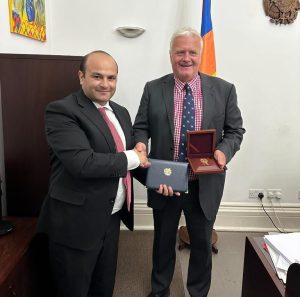
The Minister of Labor and Social Affairs Mr Narek Mkrtchyan (left) with Professor Steve Jeffery (Right)
Professor Steve Jeffery, Pioneers Medical Director has received a commemorative medal in recognition of his work assisting the Armenians during the war with Azerbaijan in 2020.
Steven, who is a Professor of Wound Study, was awarded the medal by the Prime Minister of the Republic of Armenia Nikol Pashinyan.
The Minister of Labor and Social Affairs Mr Narek Mkrtchyan and Ambassador Nersesyan presented Steve with the medal at the Armenian Embassy in London, recognising “services rendered to the Republic of Armenia in the field of healthcare and humanitarian devoted activity” during the war.
The 2020 Nagorno-Karabakh war was an armed conflict between Azerbaijan and Armenia over an ethnically and historically significant region. Steve travelled to Yerevan, near the heart of the conflict, to train Armenians to use fish skin grafts (FSG) to manage wounds.
A 2023 report was published by Steve and colleagues Fouad Reda and Hilmar Kjartansson, about the use of fish skin grafts from Kerecis™ derived from the skin of wild Atlantic cod. The fish skin contains intact epidermis and dermis layers, and is increasingly being used as an effective wound treatment strategy, with added benefits for combat situations or communities with limited resources.
According to the report, the combat environment “presents considerable logistical barriers for the treatment of wounded soldiers”. The primary goal was to use FSG in patients to stabilise and improve the wound bed before skin grafting. Other goals were to improve healing time. achieve earlier skin grating, and have better cosmetic outcomes upon healing. FSG was successfully used, allowed for earlier skin grafting procedures and reduced flap surgery requirements.
According to the Embassy of Armenia in the United Kingdom, Ambassador Nersesyan “expressed his deep gratitude to Steve, emphasising the importance of his invaluable contribution. The Ambassador highlighted that Mr Jeffery’s actions embodied the spirit of solidarity and humanitarianism, bringing hope and comfort to countless individuals during a challenging period.” (via Facebook)
“It is fantastic to see Steve’s commitment to advancing wound care recognised in this way. We are incredibly lucky to be able to learn from a colleague with such vast experience and enthusiasm for wound healing and his commitment to education and advancing the field.” – Pioneer
Steve said: “It was an honour and privilege to use my experience of war injury to treat these injured soldiers.”
Full details can be found in the report, Use of Fish Skin Graft in Management of Combat Injuries Following Military Drone Assaults in Field-Like Hospital Conditions.
